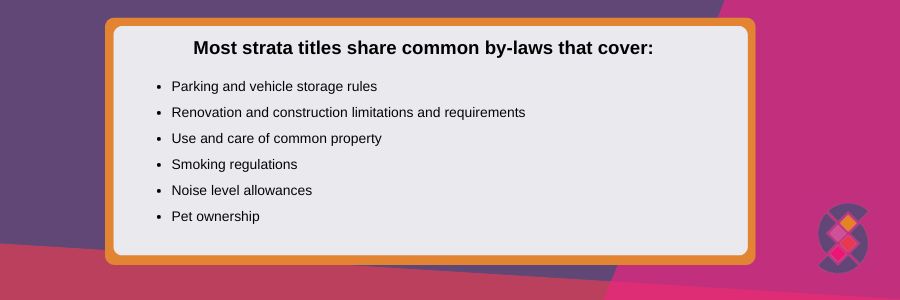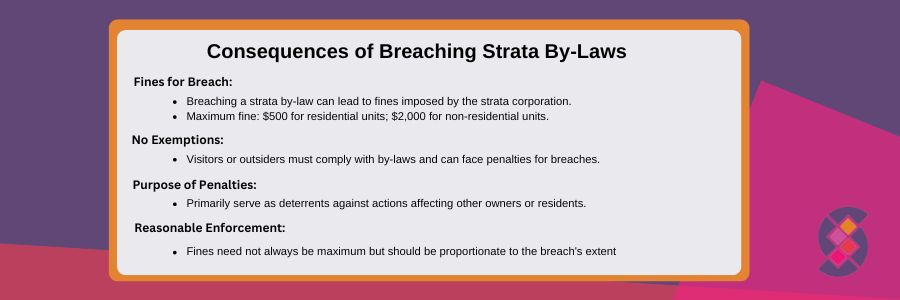Resolving Common Strata By-Law Breaches | Strata Data
Strata schemes offer owner-residents, tenants, and businesses the opportunity to co-exist within a collective space. However, due to this exact reason (living in close quarters), disputes can sometimes arise. To provide a fair and structured way for all residents to inhabit the premises, strata by-laws are put into place to govern behaviours and rules. \
Still, breaches to these by-laws may occur, requiring affected residents to take action against the party in breach of them. This guide will cover the right way to resolve strata by-law breaches for strata schemes in South Australia.

What are strata by-laws?
Strata by-laws are a set of rules that are applicable to all owners, residents, and sometimes visitors of the strata premises. These by-laws are put into place to protect the interests of all strata residents and mostly cover the use of common areas shared by them.
Just a note on terminology. By-laws are the correct term for properties under the Community Titles Act (built approx post 1996). For properties built approx pre 1996, they will usually be under the Strata Title Act and the correct terminology in that case is articles.
In general, Strata articles are a default set provided under the Act, so they are all the same.
However each Community title has its own unique set of by-laws, and residents must be aware of these by-laws to avoid breaching them.
Examples of common strata by-laws
Most strata titles share common by-laws that cover:
- Parking and vehicle storage rules
- Renovation and construction limitations and requirements
- Use and care of common property
- Noise land other nuisance (which may include smoke drift)
- Pet ownership
What happens when these are breached?
A breach of a strata by-law can result in the imposition of a fine of up to $500 by the strata corporation on the person or party in breach. In a strata where all units are non-residential, the limit for the imposed penalty is $2,000. Visitors or outsiders to the strata scheme are not exempted from complying with the by-laws and can be subject to these penalties if they are in breach of them.
The articles or by-laws may need to be amended to allow fines for breaches (if they do not already contain this provision).
As the purpose of these penalties is primarily to serve as a deterrent against actions or situations that may affect other owners or residents, the fine imposed need not always be at the maximum but should be a reasonable amount in relation to the extent of the breach.

Steps to resolve common strata by-law breaches
Given that issues, fines and penalties can constitute a time-consuming administrative process for all parties involved, it is generally not the immediate go-to action to take in the event of a breach of by-laws. Instead, the resolution process for by-law breaches involves a step-by-step escalation that allows for swifter and potentially more amicable dispute settlement.
1.Communicate with the person
When a breach of by-laws has been identified, the first thing to do is to communicate directly with the person in breach. Most of the time, clearly and calmly making the issue known to the offending party is enough to solve the problem, especially if the breach was unintentional or unknown due to a lack of familiarity with the strata’s by-laws. If you find it uncomfortable to communicate the problem alone, taking along a close friend or neighbour to confront the person in breach can provide more support.
2. Ask your strata manager to assist
Seek assistance from the strata manager. As the designated authority for the strata property, the strata manager will be able to more firmly communicate the consequences of failing to comply with the by-laws and potentially resolve the situation.
3. Notify the person of the breach in writing
Should the issue continue to persist after the breach has been communicated, the next step will be to send a written letter to the person in breach on behalf of the community corporation that outlines the offending behaviour and the specific details of the by-law breach such as the time and location. Taking this action is not compulsory, but it can be helpful if the matter escalates to court later on.
4. Keep records and evidence of the breach
Take a clear note of when the breach occurred, the actions that constituted the breach, and any evidence that clearly indicates a breach of by-laws. These can include video and audio recordings, photographs, or other documents. This evidence will be useful in proving the offence should the matter continue to escalate.
5. Issue a formal complaint
A formal complaint can be issued to the person in breach by the strata committee or the strata manager to request a stop to the offending activity. This complaint will come in the form of an official notice that is addressed to the breaching party. If the tenant is in breach of a by-law, this notice will also be sent to the owner of the unit.

If accurate, strata corporation may impose penalty
In the case of a recalcitrant offender, the strata committee can take action against them by issuing a penalty of up to $500 for residential units or up to $2,000 for non-residential units. The fine amount will be up to the discretion of the committee according to the extent of the offence.
For more complex matters, it will get taken to court
A refusal to pay the fine or continued breach of by-law by the offending party may require the matter to be resolved in a court of law. In South Australia, mediation to resolve the issue may be dealt with by the Magistrates Court, for minor civil action, or the District Court, for more complex matters.
At Strata Data, we understand that disputes like these are both unpleasant and time consuming for all parties involved. As South Australia’s leading provider of strata management for over 20 years, we can help to create a pleasant and amicable strata environment for all owners and residents with minimal disruptions and effective resolution of disputes. Contact us today to get a free proposal for our body corporate services in Adelaide.



